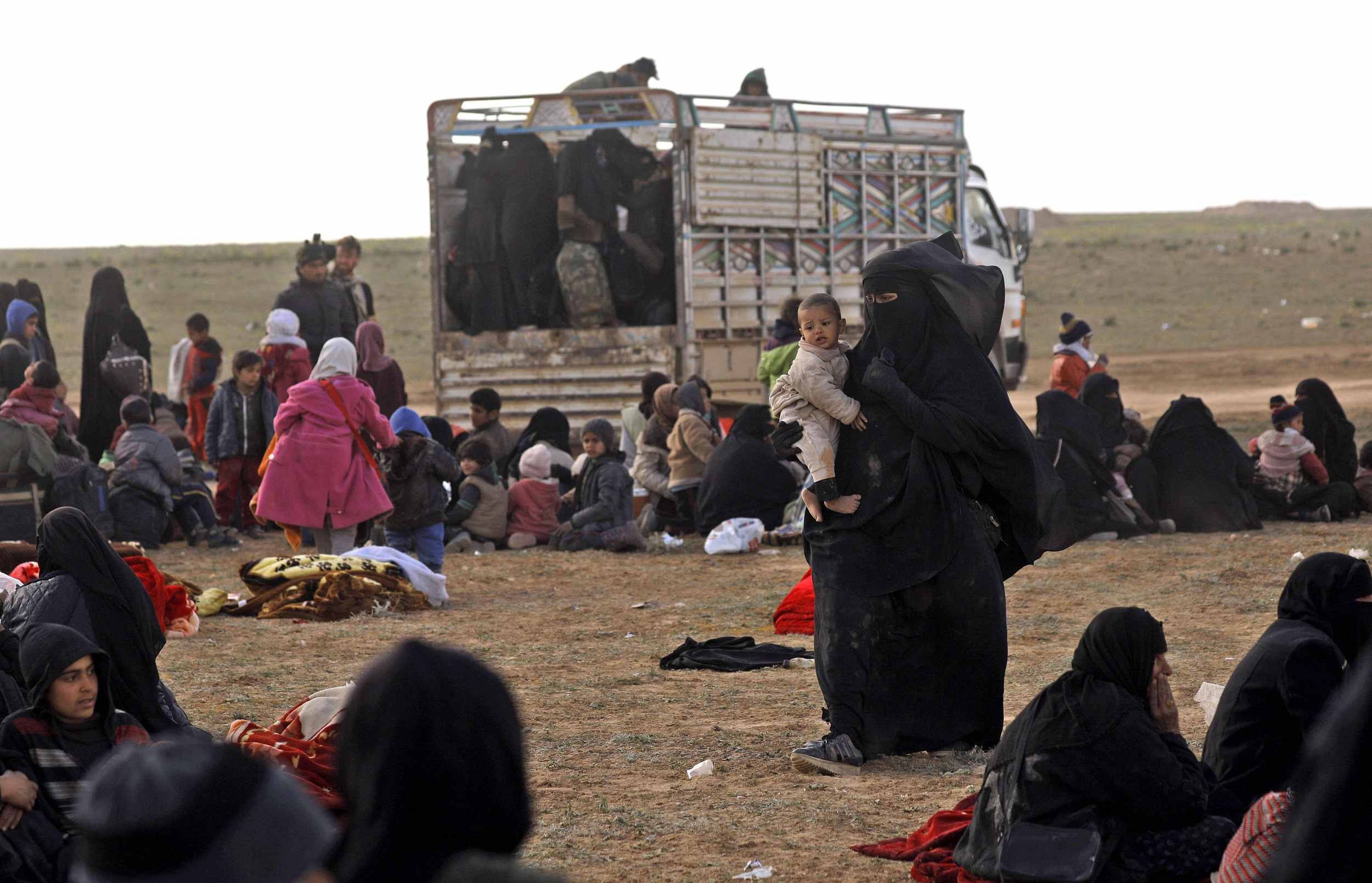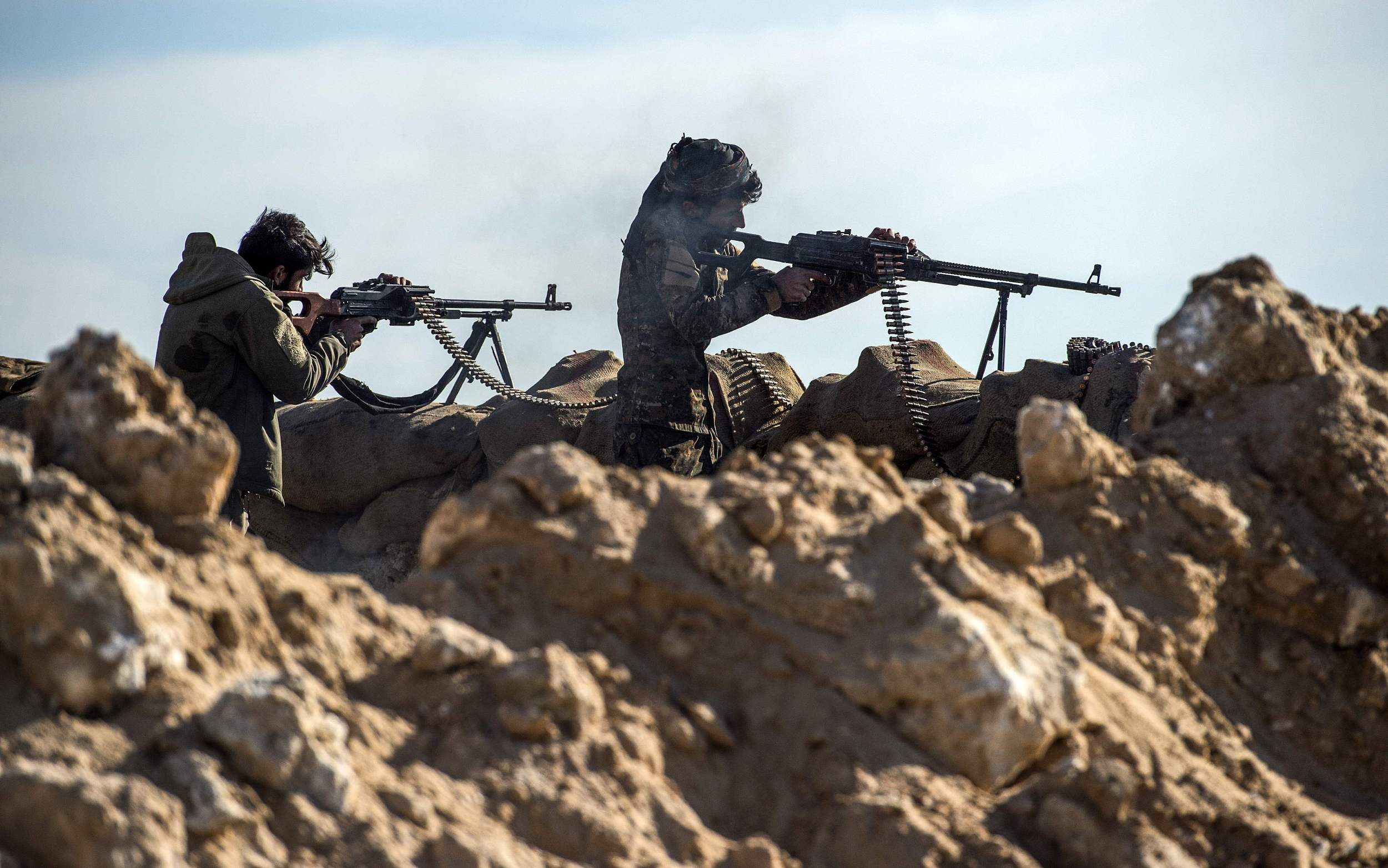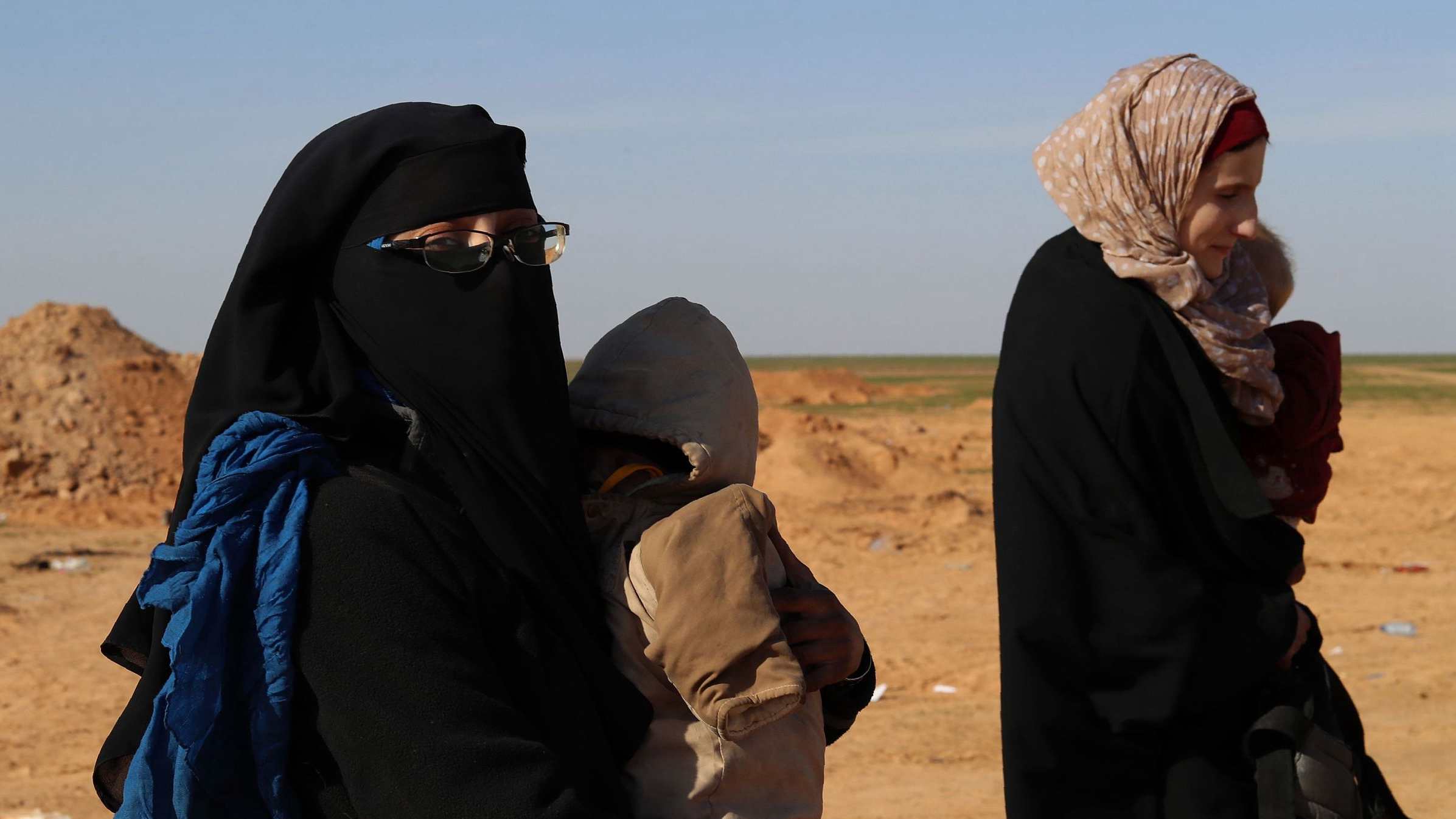They left for Syria at the height of ISIL's power, running away from their families to join a life of adventure, marrying the group's combatants and bearing their children.
Now, with ISIL crumbling, they say they want to go home – to Britain, the U.S., France or Germany.
But do their countries want them back? What are the risks involved?
The legal argument
News reports and interviews with so-called "ISIL brides" have multiplied in recent weeks. This has coincided with U.S. President Donald Trump's claim that the terror group is close to being defeated.
Exact numbers are unknown but hundreds of European nationals who joined up with ISIL are believed to still be in Syria.

ISIL fighters hold their weapons as they stand on confiscated cigarettes before setting them on fire in Raqqa, April 2, 2014. /VCG Photo
ISIL fighters hold their weapons as they stand on confiscated cigarettes before setting them on fire in Raqqa, April 2, 2014. /VCG Photo
One prominent case has been that of British teenager Shamima Begum, who along with two friends, ran away from her east London home in 2015 aged 15 to join up with ISIL.
Having married a Dutch ISIL fighter, she was recently found living in a refugee camp in northern Syria where she just gave birth to her third child.
From Vienna to Brussels, the fate of ISIL brides has preoccupied European capitals.
As EU nationals, they should be allowed to return home, many argue.
"They are our citizens and we have a responsibility to act responsibly toward them. That means they have got to come back to this country," Richard Dannatt, former head of the British army, told Sky News over the weekend.
While he was talking about ISIL fighters, the argument would apply to their families as well.

Civilians fleeing ISIL's embattled holdout of Baghouz gather in a field, February 13, 2019. /VCG Photo
Civilians fleeing ISIL's embattled holdout of Baghouz gather in a field, February 13, 2019. /VCG Photo
France's Interior Minister Christophe Castaner – asked about the fate of some 130 French ISIL fighters and their families still in Syria – noted last month that: "They are French nationals first, and jihadists second."
A Brussels court, meanwhile, ordered Belgium in December to repatriate six children born to ISIL fighters, as well as their Belgian mothers.
A potential threat
Others, however, see a potential security risk in bringing back people whose actions over the past four or five years are hard to verify.
"If you run away to join ISIS (ISIL)… I will use all my power to stop you coming back," UK Home Secretary Sajid Javid wrote
in a commentary in The Times on Sunday.
"My priority is to ensure the safety and security of this country – and I will not let anything jeopardize that," he explained, adding that citizenship was "more than an entitlement on a piece of paper."

Fully veiled women fleeing from Baghouz in eastern Syria give their names during an operation by the U.S.-backed Syrian Democratic Forces to expel hundreds of ISIL jihadists from the region, February 12, 2019. /VCG Photo
Fully veiled women fleeing from Baghouz in eastern Syria give their names during an operation by the U.S.-backed Syrian Democratic Forces to expel hundreds of ISIL jihadists from the region, February 12, 2019. /VCG Photo
The head of Britain's foreign intelligence service MI6, Alex Younger, added on Friday that anyone who lived under ISIL was "likely to have acquired the skills or connections that make them potentially very dangerous."
In Germany and Switzerland, wide scale repatriation is on hold until the respective governments have decided what to do with ISIL fighters and their families once they have returned.
Appealing for sympathy
In the meantime, the "ISIL brides" have been appealing for sympathy in a quest to get home.
"I want to go back to Germany to my family… I want my old life back," 19-year-old Leonora – who like Begum came to Syria aged 15, where she married an ISIL fighter and had two children – told AFP news agency.
"Now I know that it was a big, big mistake."
"I'm worried about my son's future," Hoda Muthana, a 24-year-old originally from Alabama,
told the newspaper The Guardian at a refugee camp in northern Syria.
"Please forgive me for being so ignorant… I was really young and ignorant," she said, insisting she had been brainwashed, suffered extreme hunger and was still traumatized by her experience.
"I believe that America gives second chances. I want to return and I'll never come back to the Middle East," she vowed.

Fighters with the U.S.-backed Syrian Democratic Forces keep a position during an operation to expel ISIL jihadists from the Baghouz area in eastern Syria, February 13, 2019. /VCG Photo
Fighters with the U.S.-backed Syrian Democratic Forces keep a position during an operation to expel ISIL jihadists from the Baghouz area in eastern Syria, February 13, 2019. /VCG Photo
A French woman who gave her name as Mathilde
told France24 that she and others like her were trying to return home "not to carry out attacks or kill people in a supermarket. We want to go home so we can try and have a normal life again."
Most ISIL brides insist they were only housewives, cooking, cleaning and taking care of the children. Their husbands were not fighters, but doctors or technicians, they add.
No remorse?
But there has been intense skepticism about the women's motives, especially as many only left ISIL in recent months, just as the group was losing ground.
Even in 2015, when a majority of these women departed for Syria, videos of horrific beheadings by ISIL fighters were making the rounds and the group's brutality was well known.
Begum
told Sky News that she knew about the videos and "I was okay with it." Muthana, according to reports, openly advocated violent killings on social media.
Most of the women have also expressed little regret over their decision to join ISIL.

A relative holds up a picture of missing British girl Shamima Begum in London, February 22, 2015. /VCG Photo
A relative holds up a picture of missing British girl Shamima Begum in London, February 22, 2015. /VCG Photo
"I don't regret it because it's changed me as a person," said Begum.
"It's made me stronger, tougher… I did have a good time there, it's just that at the end things got harder and I couldn't take it anymore."
"I think a lot of people should have, like, sympathy toward me for everything I've been through," she added.
As one British commentator bitingly put it: "Sorry my heartless little jihadi bride, but you made your bed and now you can lie in it."
Repercussions
Even if they are allowed to return home, former ISIL members will likely face repercussions.
"Those who do manage to return should be ready to be questioned, investigated and potentially prosecuted – regardless of their age or gender," Javid warned.
France's Castaner said that while ISIL fighters and their families should be allowed to return, they should be prosecuted on arrival.
After weeks on the run and facing months in a refugee camp, this is something some are prepared to face.
"Either you leave and you're pretty sure you'll end up in jail, or you stay and you're pretty sure of dying," Mathilde told France24, speaking from northeastern Syria. "I've chosen to go to prison," she added.
(Cover: German nationals Sabina, 34 (L) and Leonora, 19, who fled fighting between Syrian Democratic Forces (SDF) and ISIL jihadists in the frontline Syrian village of Baghouz, hold their children as they await to be screened and registered by the SDF, January 31, 2019. /VCG Photo)







